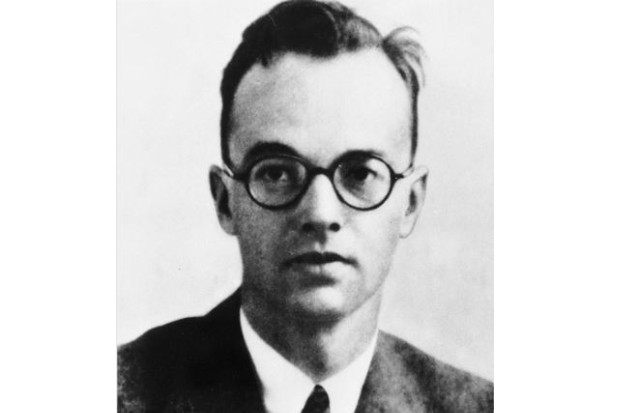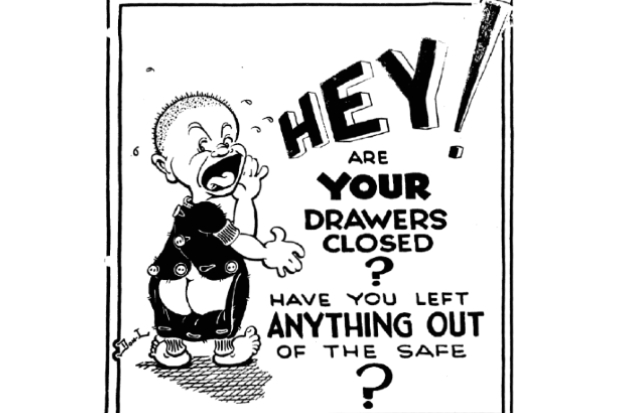Seventy years ago, Klaus Fuchs was sentenced in the Crown Court to 14 years for passing classified information to the Soviet Union. Born in Germany, Fuchs had fled the Nazis to Britain in 1933.

A brilliant scientist, he became a naturalised British citizen and received security clearance to work from 1941 on the British atomic project codenamed TUBE ALLOYS. From 1943 he worked in the US on the Manhattan Project developing the atomic bomb, and from 1947 at the British nuclear establishment at Harwell.
Fuchs was identified as a traitor in signals traffic intercepted under the US VENONA programme, and arrested in February 1950, after a series of interviews with MI5. It was not just an embarrassment to British intelligence but sent shock waves through Anglo-American atomic co-operation, already strained by US reluctance to share nuclear know-how.[i]
The fundamentals of the Anglo-American relationship remained solid, including on security and intelligence matters. However Fuchs’ arrest and conviction came at a time when the Truman Administration and Attlee’s Labour government diverged on some areas of foreign policy. This was particularly marked in respect of Communist China, where British recognition of the People’s Republic in January 1950 angered a US administration that had not abandoned support for the Nationalists in Formosa (Taiwan).
In general, US policy in the Asia Pacific region was a work in progress in early 1950. However there was a general unwillingness to do anything that might smack of supporting Western colonialism (such as British policy in the Middle East, or the Dutch and French in Indonesia).
The shock of the outbreak of the Korean War in June 1950, and the spread of Communism in South East Asia was to crystallise US policy in the region. But at the time of Fuchs’ arrest, when Foreign Secretary Ernest Bevin had just returned from the Colombo Conference, Bevin’s argument that a ‘Marshall Plan of the East’ was essential to underpin Western security found little resonance in Washington.

European integration
Kissinger’s ‘Who do I call if I want to speak to Europe?’ may be apocryphal. But in 1950 the United States, promoting free trade and convertible currencies, certainly preferred a European bloc, including Britain, to a collection of awkward independent countries. During negotiations for the implementation of the Marshall Plan, the British had resisted strong US pressure to join a European customs union.[ii]
In February 1950, Chancellor Stafford Cripps rejected a plan from the Organisation for European Economic Co-operation for a multilateral clearing system. The broader scheme being developed by Jean Monnet for a European Coal and Steel Community was to be rejected soundly by the British a few months later.[iii] Bevin, from his sick bed in April, said he would ‘like to get away from talk about Europe’. In the European context, he was going against the tide; in his broader vision, he was much closer to the spirit of Anglo-US co-operation.
Business as usual?
The Fuchs case did not derail the ‘special relationship’, nor change the fundamentals of atomic co-operation, although tripartite UK/US/Canada talks were suspended when Fuchs was arrested, and the US continued its independent development of the H-Bomb. Accusations of British security failure were tempered by the knowledge that there were US spies, to - producing headlines exploited by Senator Joseph McCarthy in his publicity-seeking crusade against the ‘Reds’.
The next few years were, of course, to see even more high-profile spy scandals, including the defection of Burgess and Maclean, and the identification of further atomic spies in America. It was to be many years before the full scale of the Soviet espionage and subversion campaign in the West became apparent.
In that context, the Fuchs case, though significant, was one element of a much broader threat, to which Anglo-American solidarity was to be a crucial part of the response. In April 1950, Ernest Bevin urged that ‘We must think in terms of the West, the Free Nations or the Free World’. While London and Washington may have differed on matters of emphasis and approach, they were at one on this point.
Keep tabs on the past: sign up for our email alerts
Follow our Foreign & Commonwealth Historians on Twitter @FCOHistorians
[i] Full details of the Fuchs investigation can be found in Security Service files at The National Archives (TNA), KV 2/1245ff. See also a recent biography by Frank Close, TRINITY: The Treachery and Pursuit of the Most Dangerous Spy in History (London: Allen Lane, 2019, and the official history of MI5, Defence of the Realm by Christopher Andrew (London: Penguin, 2009).
[ii] See Documents on British Policy Overseas (DBPO), Series I, Vol. XI.
[iii] Details in Documents on British Policy Overseas (DBPO) Series II, Vol. I.